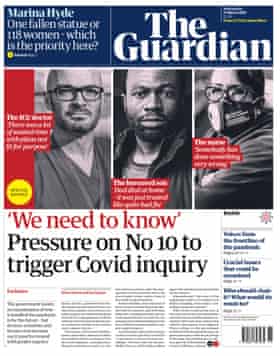A public inquiry will be set up by next spring to investigate “rigorously and candidly” what mistakes the UK government made during the coronavirus pandemic, Boris Johnson has announced.
The prime minister said it was “absolutely vital” that “we should learn the lessons” of tackling Covid, promising a chair would be appointed and terms of reference confirmed after consultation with the devolved administrations in Scotland, Wales and Northern Ireland.
He admitted bereaved families may be anxious for the inquiry to start earlier than spring 2022, but said it would be wrong to “weigh down” scientific advisers and take up “huge amounts of officials’ time” when they may still be in the middle of the pandemic if cases rise again this winter.
The Labour leader, Sir Keir Starmer, suggested he wanted the inquiry to begin in less than 12 months, asking in parliament: “Why can it not be later this year? Why can it not start earlier?”

Johnson’s announcement came after the Guardian in March highlighted calls for an inquiry from the Covid-19 Bereaved Families for Justice group, frontline health workers and the former head of the civil service Gus O’Donnell. At the time, the government said an immediate inquiry would be wrong given the UK was still in lockdown.
On Tuesday, for the first time, Johnson set a loose timeframe on the independent inquiry he has previously promised, saying it would commence by the end of the new parliamentary session, expected to last about a year.
Setting out further details on Wednesday, the prime minister said the inquiry would be fully independent and have “the ability to compel the production of all relevant materials and take oral evidence in public, under oath”.
Johnson signalled the inquiry probably would not start before next spring because there was a high likelihood that Covid cases would increase again in the winter. “We must not inadvertently divert or distract the people on whom we depend in the heat of our struggle against this disease,” he said.
He said: “I expect that the right moment for the inquiry to begin is at the end of this period, in the spring of next year, spring 2022.”
The inquiry would therefore be “able to look at the events of the last year in the cold light of day” and would be free to “hear from all the key players” and “analyse and learn from the breadth of our response”.
Given it is being set up under the 2005 Inquiries Act, the government will be in charge of appointing a chair and panellists, and also a judge if it wishes.
Speaking later, Johnson’s spokesman said no decision had been taken on from what profession or area of expertise the chair should come.
He confirmed the inquiry would not begin before spring next year, but denied this was an excessive delay, or was intended to push its findings beyond another general election.
He said: “We want this to be done in a reasonable timescale. We will come forward with terms of reference and name of chair in due course.”
The prime minister was urged to confirm that the inquiry would also investigate cases of long Covid and the treatment available to patients who have it. Johnson said that would be up to the chair, but he doubted they would exclude the matter.
Opposition MPs also said the inquiry should dig into the poor level of financial support to some groups, contracts for personal protective equipment being “awarded to Tory chums and friends”, and how the Conservative peer Dido Harding was selected to head NHS test and trace.
Tory MPs were supportive of Johnson’s timetable for an inquiry. The former health secretary Jeremy Hunt said the health select committee that he chairs was running its own inquiry that would report in July, “so the government will have an early chance to learn immediate lessons”.
He added: “It would be crazy to ask ministers and officials to spend time with lawyers, going through emails, texts and WhatsApps, when we want their entire focus to be on the pandemic.”
But Layla Moran, the Lib Dem MP who chairs the parliamentary group also conducting an inquiry, said delaying the inquiry would “only prolong the pain being felt by grieving families and means vital lessons will go unlearned”.
She added: “There is no time to waste in ensuring the NHS and social care sector are better prepared against Covid variants and a potential third wave.”
The prime minister also expressed support for a memorial being set up in St Paul’s Cathedral, London, to the 127,629 people who have died in the UK within 28 days of testing positive for coronavirus, saying he would establish a commission to look into the idea.
This content first appear on the guardian
